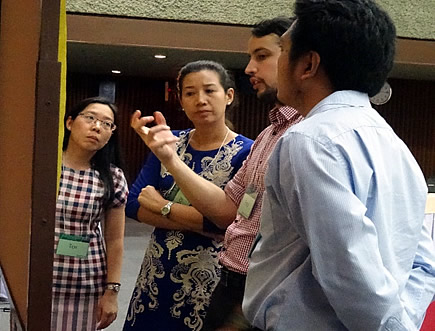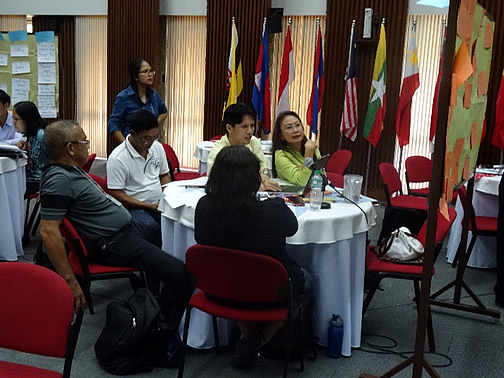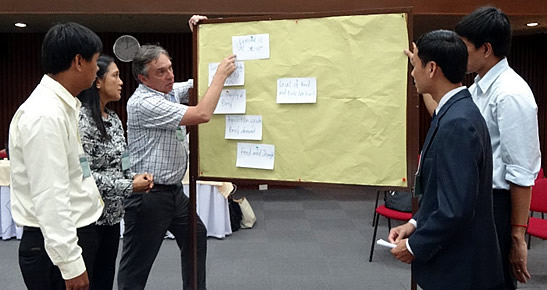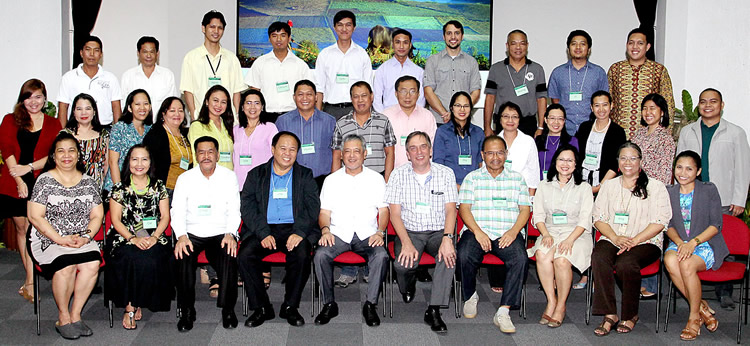 SEARCA, in partnership with the Fenner School of Environment and Society of the Australian National University (ANU) and the University of the Philippines Los Baños (UPLB) College of Human Ecology (CHE), offered the five-day training-workshop on Developing, Planning, and Implementing Inclusive and Sustainable Agricultural and Rural Development (ISARD) Projects on 22-26 June 2015 at its headquarters here.
SEARCA, in partnership with the Fenner School of Environment and Society of the Australian National University (ANU) and the University of the Philippines Los Baños (UPLB) College of Human Ecology (CHE), offered the five-day training-workshop on Developing, Planning, and Implementing Inclusive and Sustainable Agricultural and Rural Development (ISARD) Projects on 22-26 June 2015 at its headquarters here.
Among the 24 participants from four Southeast Asian countries were local government stakeholders in two ISARD pilot sites of SEARCA, a national agency researcher, and a team of ULB CHE facilitators.
SEARCA is championing ISARD in the Southeast Asian region. Having more than 40 years of institutional and capacity strengthening in agricultural and rural development (ARD) in Southeast Asia, SEARCA is now promoting development of effective models of ISARD in its Tenth Five-Year Plan (2014-2019). ISARD is anchored on building and empowering human and institutional capacities. The training-workshop focused on: 1) innovative and systems approach in the management of ISARD; and 2) adaptive project management life cycle for ISARD.
 According to Dr. Saguiguit, SEARCA hopes to contribute “not just to refining models and approaches that redound to relevant policies and programs in agricultural and rural development, but more specifically, to tangible outcomes toward food and nutrition security in selected ISARD pilot sites through research and development, capacity building, and knowledge management.”
According to Dr. Saguiguit, SEARCA hopes to contribute “not just to refining models and approaches that redound to relevant policies and programs in agricultural and rural development, but more specifically, to tangible outcomes toward food and nutrition security in selected ISARD pilot sites through research and development, capacity building, and knowledge management.”
Prof. Wilfredo B. Carada, Professor at the UPLB College of Public Affairs and Development and Training-Workshop Technical Coordinator, explained that the training-workshop is composed of two modules. Module 1 is about an Innovative and system-based framework in the management of ISARD, while Module 2, which is divided into several parts, focuses on management of ISARD programs/projects.
During the first day of the training-workshop, participants presented the agricultural commodity systems in their areas, which was their pre-training-workshop assignment. On 25 June, they visited the farm and the farmer-cooperators of Putho-Tuntungin, Los Baños, Laguna, who are beneficiaries of the project "Enhancing Gender Sensitive Organic Vegetable Production in Low-Income Communities of Los Baños, Laguna." This project is under the program "Enhancing Gender-Sensitive Sustainable Agriculture and Aquatic S&T-based Livelihood Enterprises in Los Baños,” which is a collaboration between the Philippine Council for Agriculture, Aquatic, and Natural Resources Research and Development (PCAARRD) and the Local Government Unit of Los Baños. (Deanna Jasmin M. Pausal)

